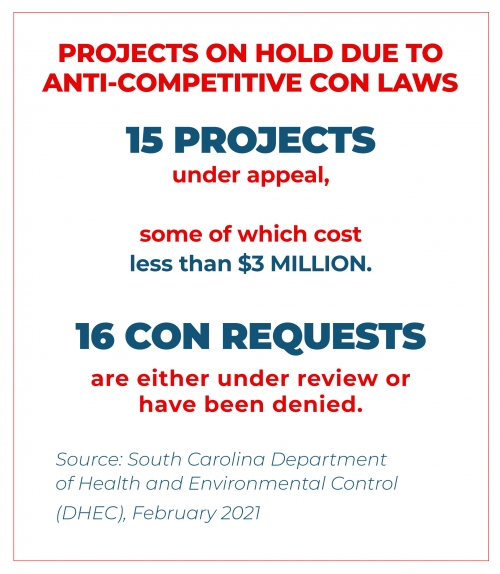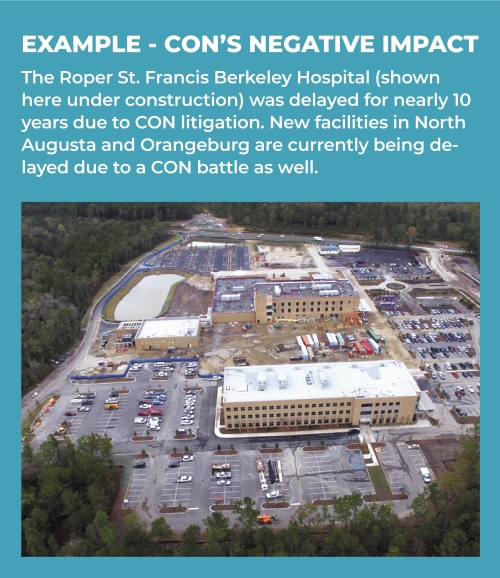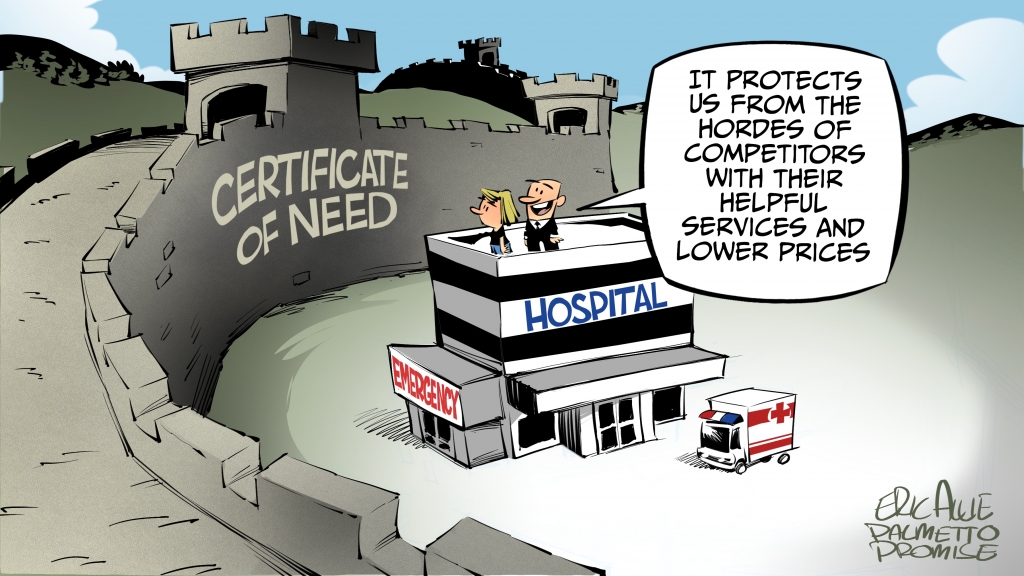Fast Facts: South Carolina’s Anti-Competitive Certificate of Need (CON) Laws
Since 1971, South Carolina has been among the states that have restricted supply of healthcare services through Certificate of Need, or CON, laws. Rather than market demand determining the supply, under CON laws, clinicians and medical facilities must seek approval from the state before purchasing or expanding services they provide to patients. Competitors can then delay and even prevent new facilities from being built through the CON process.
Once it became clear that COVID-19 could overwhelm our hospitals, Governor McMaster (along with 21 other CON states) temporarily waived CON regulations so hospitals could add capacity, particularly hospital beds, to their facilities. South Carolina could become the first of those states to make CON repeal permanent.
South Carolina’s CON program is one of the most restrictive in the United States.
South Carolina requires a CON for 18 different services, including hospital renovations/new equipment that is over $600,000 and adding one or more hospital beds to a facility.

Why repeal CON?
- Higher Costs
The Mercatus Center calculates that per-capita healthcare spending in South Carolina is $200 higher because of CON laws and spending on physicians is $69 higher than necessary. - Less Rural Healthcare Facilities
Research shows that without a CON program, South Carolina could add as many as 10 rural hospitals and rural ambulatory service centers (ASCs) in areas of need. - Lower Quality
Mercatus estimates that there would be a 5% decrease in the rate of deaths from post-surgery complications in South Carolina without a CON program. - Lower Utilization Rates
Without CON laws in place, Mercatus estimates that South Carolina would see a 36% increase in utilization of MRI scans and Positron Emission Tomography (PET) utilization rates would double.

Trump and Obama Administrations agree on this: Repeal SC CON laws
2015 Obama Administration Report:
“CON laws, when first enacted, had the laudable goals of reducing health care costs and improving access to care. However, after considerable experience, it is now apparent that CON laws can prevent the efficient functioning of health care markets… For these reasons… the Agencies historically have suggested that states consider repeal or retrenchment of their CON laws, and in this case, respectfully suggest that South Carolina repeal its CON laws.”
Source: Joint Statement of the Federal Trade Commission and the Antitrust Division of the US Department of Justice on Certificate of Needs Laws and South Carolina House Bill 3250, January 11, 2016.
2018 Trump Administration Report:
“Secretaries Alex Azar, Steven Mnuchin, and Alexander Acosta accused states of holding back innovation in health care laws. “Available evidence suggests that CON laws have failed to produce cost savings, higher quality healthcare, or greater access to care, whether in underserved communities or in underserved areas.”
Source: “Reforming America’s Healthcare System Through Choice and Competition” U.S. Department of Health and Human Services, U.S. Department of the Treasury, U.S. Department of Labor, November 30, 2018

South Carolina services that require a CON:
- Ambulatory Surgical Centers (ASCs)
- Cardiac Catheterization
- Gamma Knives Home Health
- Hospice
- Hospital Beds (Acute, General Licensed, MedSurg, etc.)
- Intermediate Care Facilities (ICFs) for Individuals with Intellectual Disabilities
- Linear Accelerator Radiology
- Long-Term Acute Care (LTAC)
- Neonatal Intensive Care
- New Hospitals or Hospital-Sized Investments
- Nursing Home Beds/Long-Term Care Beds
- Obstetrics Services
- Open-Heart Surgery
- Psychiatric Services
- Radiation Therapy
- Rehabilitation
- Substance/Drug Abuse






